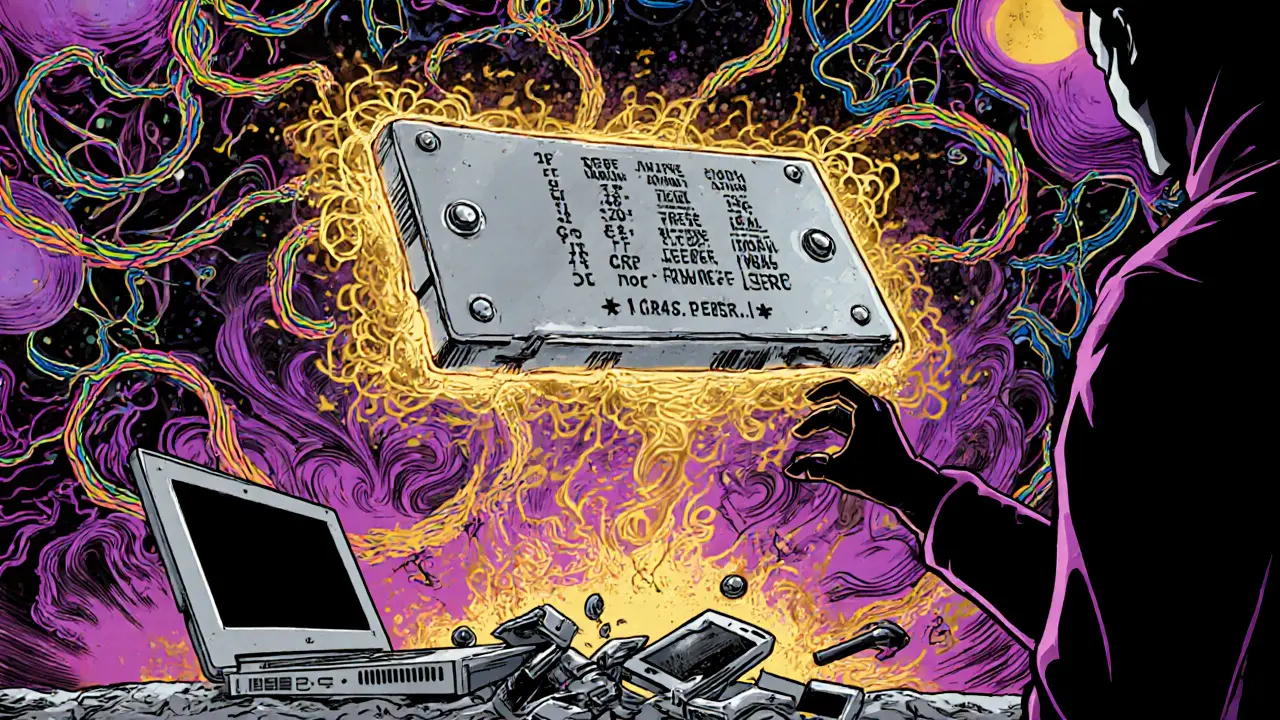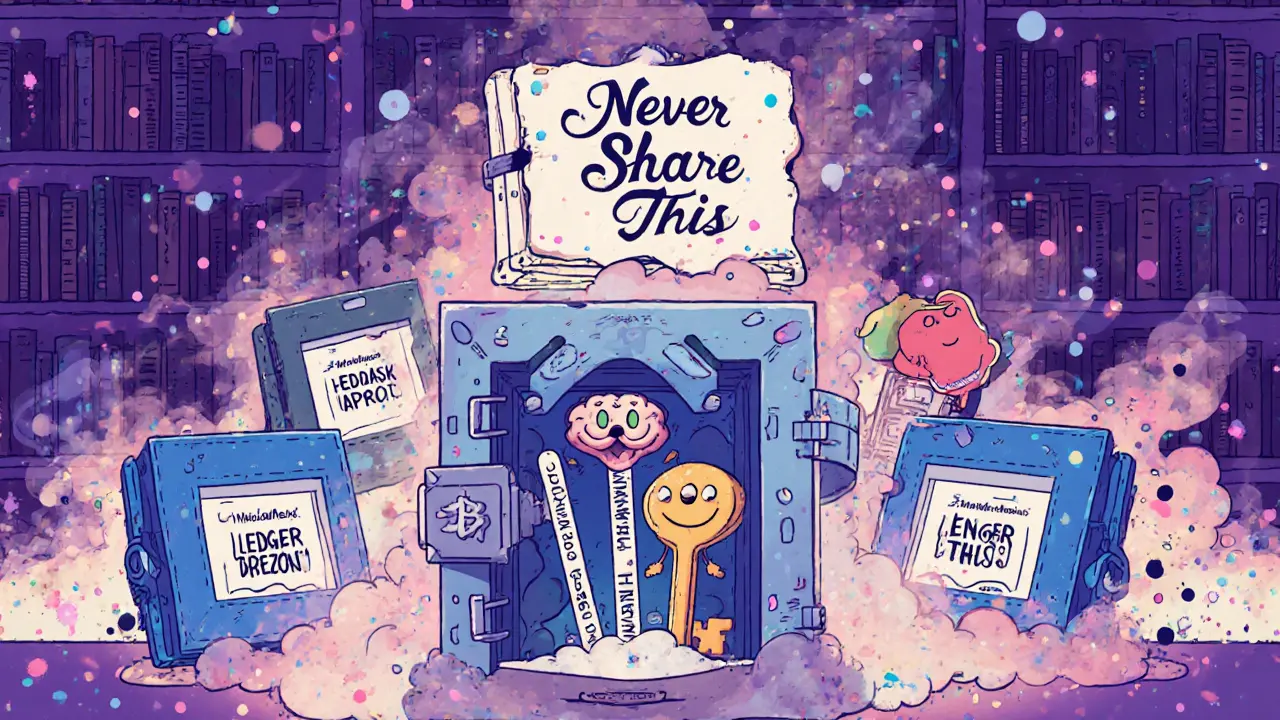Understanding BIP39 Seed Phrase Standard for Crypto Wallet Recovery
BIP39 Seed Phrase Validator
Imagine losing your phone, your wallet, or even your entire computer-but still being able to get back every single cryptocurrency you own. That’s the power of a BIP39 seed phrase. It’s not just a list of words. It’s your master key to everything in your digital wallet. And if you’re holding Bitcoin, Ethereum, or any other major crypto, you’re already using it-even if you don’t realize it.
What Exactly Is a BIP39 Seed Phrase?
BIP39 stands for Bitcoin Improvement Proposal 39. It’s a technical standard created in 2013 to make crypto wallets easier and safer to back up. Before BIP39, users had to copy and store long strings of random letters and numbers-private keys-that were nearly impossible to remember or write down without mistakes. One typo, one smudged ink spot, and your coins were gone forever.
BIP39 changed that. Instead of raw keys, it turned complex cryptographic data into a sequence of easy-to-write, human-readable words. Think of it like a password made of dictionary words instead of symbols and numbers. The standard uses a fixed list of exactly 2,048 words. These aren’t random words-they’re carefully chosen so that even if you misread one, the first four letters are usually enough to tell which word it is. That’s why “apple,” “apply,” and “apricot” won’t confuse your wallet: each starts with a unique four-letter combo.
Most wallets use either 12 or 24 words. A 12-word phrase gives you 128 bits of security. That’s more than enough to protect your funds against any brute-force attack today-and likely for decades to come. A 24-word phrase doubles that to 256 bits, which is overkill for most people but used by institutions or those holding massive amounts of crypto.
How Does BIP39 Actually Work?
It’s not magic. It’s math. Here’s how it works in simple steps:
- Your wallet generates a random string of bits-true randomness, not something you pick.
- That string is split into chunks of 11 bits each. Each 11-bit chunk equals a number between 0 and 2047.
- Each number maps to one word in the BIP39 wordlist. So 12 words = 132 bits of data.
- Before the final word, a checksum is added. That’s a small piece of data derived from the original random string. It lets the wallet check if you typed the phrase correctly.
- When you enter your 12 or 24 words, the wallet reassembles the bits, verifies the checksum, and rebuilds your private keys.
That’s it. The whole process happens automatically inside your wallet app. You don’t need to understand the math. But you do need to know this: the seed phrase is the only thing that can recover your wallet. No email, no password reset, no customer support. If you lose it, your crypto is gone.
Why BIP39 Is the Industry Standard
Every major wallet-Ledger, Trezor, MetaMask, Exodus, Trust Wallet, Coinbase Wallet-uses BIP39. So does every major blockchain: Bitcoin, Ethereum, Solana, Polygon, Cardano, and hundreds more. That’s because BIP39 solved the biggest problem in crypto: interoperability.
Before BIP39, if you used Wallet A, you couldn’t restore your balance in Wallet B. You were locked in. BIP39 changed that. Now, if your Ledger breaks, you can plug your 12-word phrase into a Trezor and get everything back. If you switch from MetaMask to Phantom, your tokens move with you. This universal compatibility is why BIP39 became the default.
It’s also why recovery services exist. Companies like DataRecovery.com get hundreds of calls every month from people who wrote down their seed phrase wrong-misspelled a word, forgot one, or wrote it on a napkin that got thrown out. The good news? Because of the checksum and wordlist structure, many of these cases can be fixed. If you’re missing one word, or got one wrong, recovery tools can often guess the right one from the 2,048 possibilities. But if you lost half the phrase? That’s nearly impossible.

The Hidden Danger: Passphrases
BIP39 includes an optional feature called a “passphrase” or “25th word.” It’s an extra secret you can add on top of your 12 or 24 words. Think of it like a second password. If someone steals your seed phrase but doesn’t know your passphrase, they still can’t access your funds.
That sounds great, right? But here’s the catch: passphrases are not backed up by your wallet. If you forget it, you lose everything-even if you have the perfect seed phrase. And if you write it down next to your seed phrase, you’ve defeated the whole purpose.
Most wallets hide this feature by default. Why? Because it’s too easy to mess up. A 2024 survey by Vault12 found that over 60% of users who enabled passphrases lost access to their funds within a year-not because of hackers, but because they forgot the extra word. For most people, the risk outweighs the reward. Stick to the 12 or 24 words. Keep them safe. Don’t overcomplicate it.
How to Store Your Seed Phrase Safely
Storing your seed phrase is the single most important thing you’ll ever do in crypto. Here’s how to do it right:
- Never store it digitally. No screenshots. No cloud backups. No text messages. If your phone gets hacked, your crypto is gone.
- Write it on paper. Use a pen, not a pencil. Store it in a fireproof safe or a safety deposit box.
- Make two copies. Keep one at home, one in a trusted location. Don’t hide them both in the same place.
- Don’t label it. Don’t write “Bitcoin Seed Phrase” on the paper. Call it “My Vacation Notes” or something neutral.
- Test it. Once you’ve written it down, restore it on a brand-new wallet (on a clean device) to make sure it works. Do this before you deposit real money.
Some people use metal seed phrase plates-engraved steel or brass sheets that won’t burn or corrode. They’re worth the investment if you’re holding more than a few thousand dollars in crypto.

What to Avoid
Here are the most common mistakes people make:
- Trying to create your own seed phrase. Never do this. Human brains aren’t random. You’ll pick patterns that hackers can guess.
- Typing your seed phrase into a website. Even a fake “wallet restore” page can steal it.
- Letting someone else see it. Not your spouse, not your kid, not your crypto buddy. Ever.
- Using a photo of your phrase. Phones get stolen. Clouds get breached.
- Believing “I’ll remember it.” You won’t. Not in six months. Not in a year.
There’s no such thing as “too careful” with your seed phrase. Treat it like the title to your house. Or the combination to your safe. If you lose it, you lose everything.
The Future of BIP39
Will BIP39 be replaced? Unlikely. It’s too deeply embedded in the infrastructure of crypto. Even new protocols like Ethereum’s EIP-4337 (account abstraction) still rely on BIP39 for user recovery. The focus now isn’t on replacing it-it’s on teaching people how to use it properly.
Wallet makers are slowly adding better warnings, visual cues, and recovery checklists. Hardware wallets now include printed guides and QR code backups. Some even let you split your seed phrase into parts and store them with different people-a method called “Shamir’s Secret Sharing.” But the core idea remains: 12 or 24 words, generated randomly, stored securely.
As crypto becomes more mainstream, BIP39 will keep working in the background. It’s not flashy. It doesn’t make headlines. But it’s the quiet foundation that lets you own your money without a bank.
Can I generate my own BIP39 seed phrase?
No. Never generate your own seed phrase manually. Human beings are terrible at creating true randomness. Even if you think you’re picking random words, your brain follows patterns. Wallet software uses cryptographically secure random number generators to ensure each word is truly unpredictable. If you create your own, you’re making your funds vulnerable to guessing attacks.
Are BIP39 seed phrases the same across all cryptocurrencies?
Yes, the seed phrase itself is universal. A 12-word BIP39 phrase generated by a Bitcoin wallet can restore your Ethereum, Solana, or Polygon accounts in any compatible wallet. The difference lies in how each blockchain interprets the keys derived from that phrase. But the phrase-those 12 or 24 words-is the same across all major crypto networks.
What if I lose one word in my seed phrase?
If you’re missing one word and remember the rest, recovery is often possible. Tools exist that can test all 2,048 possible words in the missing position, using the checksum to validate the correct one. Many professional recovery services can help for a fee. But if you’re missing two or more words, the chances drop dramatically. Always keep your full phrase safe.
Is a 12-word seed phrase secure enough?
Yes. A 12-word BIP39 phrase provides 128 bits of security, which is considered unbreakable with current technology. Even if a supercomputer tried every possible combination, it would take longer than the age of the universe. Most experts agree this is more than sufficient for personal use. Only large institutions or high-net-worth individuals typically use 24-word phrases for extra caution.
Can someone steal my crypto if they see my seed phrase?
Absolutely. Anyone who has your seed phrase can access your wallet from any device. They don’t need your password, your phone, or your email. Just the 12 or 24 words. That’s why you should never share it, never photograph it, and never type it into any website-even one that looks legitimate. Treat it like the key to your home.
Katherine Wagner
November 14, 2025 AT 03:57Hannah Kleyn
November 15, 2025 AT 06:47Vanshika Bahiya
November 16, 2025 AT 22:58gary buena
November 17, 2025 AT 04:33Kevin Hayes
November 18, 2025 AT 17:09Albert Melkonian
November 20, 2025 AT 01:58David Cameron
November 20, 2025 AT 16:53Robert Astel
November 21, 2025 AT 08:56Kelly McSwiggan
November 22, 2025 AT 02:19Liz Watson
November 23, 2025 AT 23:07Cherbey Gift
November 24, 2025 AT 20:20Anthony Forsythe
November 26, 2025 AT 14:01Rachel Anderson
November 28, 2025 AT 08:45Hamish Britton
November 29, 2025 AT 11:42Andrew Parker
November 30, 2025 AT 03:52Kandice Dondona
December 1, 2025 AT 23:44Mauricio Picirillo
December 2, 2025 AT 18:06ratheesh chandran
December 3, 2025 AT 16:12